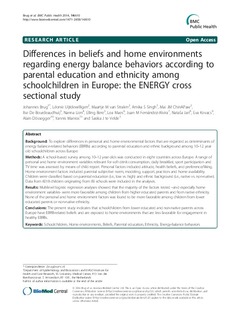| dc.contributor.author | Brug, Johannes | |
| dc.contributor.author | Uijtdewilligen, Léonie | |
| dc.contributor.author | Van Stralen, Maartje M. | |
| dc.contributor.author | Singh, Amika S. | |
| dc.contributor.author | Chinapaw, Mai J. | |
| dc.contributor.author | De Bourdeaudhuij, Ilse | |
| dc.contributor.author | Lien, Nanna | |
| dc.contributor.author | Bere, Elling | |
| dc.contributor.author | Maes, Lea | |
| dc.contributor.author | Fernández-Alvira, Juan M. | |
| dc.contributor.author | Jan, Nataša | |
| dc.contributor.author | Kovacs, Eva | |
| dc.contributor.author | Dössegger, Alain | |
| dc.contributor.author | Manios, Yannis | |
| dc.contributor.author | te Velde, Saskia J. | |
| dc.date.accessioned | 2014-08-26T12:47:29Z | |
| dc.date.available | 2014-08-26T12:47:29Z | |
| dc.date.issued | 2014 | |
| dc.identifier.citation | Brug, J., Uijtdewilligen, L., Van Stralen, M. M., Singh, A. S., Chinapaw, M. J., De Bourdeaudhuij, I., . . . Te Velde, S. J. (2014). Differences in beliefs and home environments regarding energy balance behaviors according to parental education and ethnicity among schoolchildren in Europe: The ENERGY cross sectional study. BMC Public Health, 14(1), 1-9. doi: 10.1186/1471-2458-14-610 | nb_NO |
| dc.identifier.issn | 1471-2458 | |
| dc.identifier.uri | http://hdl.handle.net/11250/218161 | |
| dc.description | Published version of an article in the journal: BMC Public Health. Also available from the publisher at: http://dx.doi.org/10.1186/1471-2458-14-610 Open Access | nb_NO |
| dc.description.abstract | Background: To explore differences in personal and home environmental factors that are regarded as determinants of energy balance-related behaviors (EBRBs) according to parental education and ethnic background among 10-12 year old schoolchildren across Europe. Methods. A school-based survey among 10-12 year olds was conducted in eight countries across Europe. A range of personal and home environment variables relevant for soft drink consumption, daily breakfast, sport participation and TV time was assessed by means of child report. Personal factors included attitude, health beliefs, and preference/liking. Home environment factors included parental subjective norm, modeling, support, practices and home availability. Children were classified based on parental education (i.e., low vs. high) and ethnic background (i.e., native vs. non-native). Data from 6018 children originating from 83 schools were included in the analyses. Results: Multilevel logistic regression analyses showed that the majority of the factors tested -and especially home environment variables- were more favorable among children from higher educated parents and from native ethnicity. None of the personal and home environment factors was found to be more favorable among children from lower educated parents or non-native ethnicity. Conclusions: The present study indicates that schoolchildren from lower educated and non-native parents across Europe have EBRB-related beliefs and are exposed to home environments that are less favorable for engagement in healthy EBRBs. | nb_NO |
| dc.language.iso | eng | nb_NO |
| dc.publisher | BioMed Central | nb_NO |
| dc.subject | VDP::Medisinske Fag: 700::Helsefag: 800 | nb_NO |
| dc.subject | beliefs, energy-balance behaviors, ethnicity, home environments, parental education, schoolchildren | nb_NO |
| dc.title | Differences in beliefs and home environments regarding energy balance behaviors according to parental education and ethnicity among schoolchildren in Europe: The ENERGY cross sectional study | nb_NO |
| dc.type | Journal article | nb_NO |
| dc.type | Peer reviewed | nb_NO |
| dc.source.pagenumber | 1-9 | nb_NO |
| dc.source.volume | 14 | nb_NO |
| dc.source.journal | BMC Public Health | nb_NO |
| dc.identifier.doi | 10.1186/1471-2458-14-610 | |
